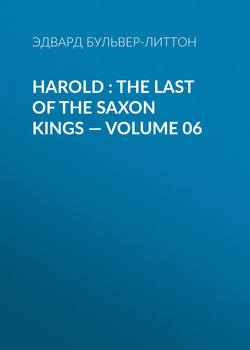Читать книгу Harold : the Last of the Saxon Kings — Volume 06 - Эдвард Джордж Бульвер-Литтон, Эдвард Бульвер-Литтон - Страница 3
BOOK VI. AMBITION CHAPTER III
ОглавлениеWhether, owing to Hilda's runes, or to the merely human arts which accompanied them, the Earl's recovery was rapid, though the great loss of blood he had sustained left him awhile weak and exhausted. But, perhaps, he blessed the excuse which detained him still in the house of Hilda, and under the eyes of Edith.
He dismissed the leach sent to him by Vebba, and confided, not without reason, to the Vala's skill. And how happily went his hours beneath the old Roman roof!
It was not without a superstition, more characterised, however, by tenderness than awe, that Harold learned that Edith had been undefinably impressed with a foreboding of danger to her betrothed, and all that morning she had watched his coming from the old legendary hill. Was it not in that watch that his good Fylgia had saved his life? Indeed, there seemed a strange truth in Hilda's assertions, that in the form of his betrothed, his tutelary spirit lived and guarded. For smooth every step, and bright every day, in his career, since their troth had been plighted. And gradually the sweet superstition had mingled with human passion to hallow and refine it. There was a purity and a depth in the love of these two, which, if not uncommon in women, is most rare in men.
Harold, in sober truth, had learned to look on Edith as on his better angel; and, calming his strong manly heart in the hour of temptation, would have recoiled, as a sacrilege, from aught that could have sullied that image of celestial love. With a noble and sublime patience, of which perhaps only a character so thoroughly English in its habits of self-control and steadfast endurance could have been capable, he saw the months and the years glide away, and still contented himself with hope;—hope, the sole godlike joy that belongs to men!
As the opinion of an age influences even those who affect to despise it, so, perhaps, this holy and unselfish passion was preserved and guarded by that peculiar veneration for purity which formed the characteristic fanaticism of the last days of the Anglo-Saxons,—when still, as Aldhelm had previously sung in Latin less barbarous than perhaps any priest in the reign of Edward could command:
"Virginitas castam servans sine crimine carnem
Caetera virtutem vincit praeconia laudi—
Spiritus altithroni templum sibi vindicat almus;"11
when, amidst a great dissoluteness of manners, alike common to Church and laity, the opposite virtues were, as is invariable in such epochs of society, carried by the few purer natures into heroic extremes. "And as gold, the adorner of the world, springs from the sordid bosom of earth, so chastity, the image of gold, rose bright and unsullied from the clay of human desire."12
And Edith, though yet in the tenderest flush of beautiful youth, had, under the influence of that sanctifying and scarce earthly affection, perfected her full nature as woman. She had learned so to live in Harold's life, that—less, it seemed, by study than intuition—a knowledge graver than that which belonged to her sex and her time, seemed to fall upon her soul—fall as the sunlight falls on the blossoms, expanding their petals, and brightening the glory of their hues.
11
"The chaste who blameless keep unsullied fame,
Transcend all other worth, all other praise.
The Spirit, high enthroned, has made their hearts
His sacred temple."
SHARON TURNER's Translation of Aldhelm, vol. iii. p. 366. It is curious to see how, even in Latin, the poet preserves the alliterations that characterised the Saxon muse.
12
Slightly altered from Aldhelm.
